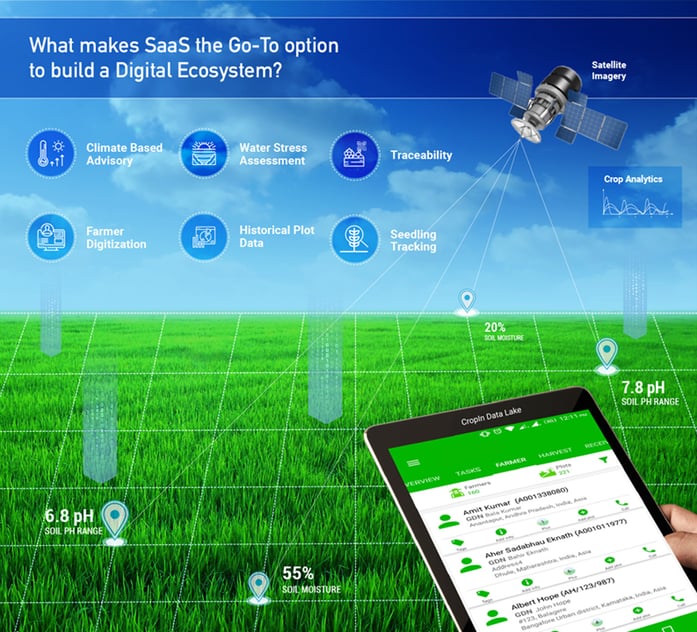Listen here:
This article was originally published in CIO Review India's SaaS Startups Special edition, January 2019.
Nathan Myhrvold, former Chief Technology Officer at Microsoft, had once quipped, “Software is a gas; it expands to fill its container”. Such is the current disposition of software-as-a-service, one of the more recently popular methods through which software is delivered to its registered users. SaaS, as it is more popularly called, is a cloud-based software model that allows for a licensing or a subscription model where users access their organization’s data from any device connected to the Internet.
With more sectors progressively adopting technology into their systems to boost operational efficiency and to bring about a structure and organization to their processes, SaaS capabilities are also being tested and pushed beyond what was once imagined. SaaS platforms are being designed to accommodate the multiplying requirements of enterprises as they attempt to solve a new challenge each day. Businesses worldwide are undergoing a digital transformation, and SaaS solutions are aiding the process by creating an adaptable and versatile environment that is profitable to both the enterprise and to the end consumer.

Technologists will agree that given the present conditions, SaaS platforms are the way forward for any industry to leverage cutting-edge technology and drive their business towards excellence, for multiple reasons.
Strategic Outsourcing
At a time when organizations are required to respond to several business challenges and opportunities on a day-to-day basis, it is prudent to propel a sizeable portion of the work to a vendor who specializes—and also excels—in developing IT infrastructure that supports business operations without any glitch, and is constantly up-to-date. This helps the company focus its time and effort on making its core business processes more efficient, without having to worry about complex IT requirements.
In other words, the SaaS platform would act as the fuel to the company’s growth, in place of an in-house solution that could possibly be an unneeded dead-weight, which depletes resources.
Configurability and Profitability
Owing to the explosion of SaaS services within the last decade, it has now become convenient for businesses to choose a solution that best addresses specific business goals within the allocated budget, and integrate the same with the existing digital system in a cost-effective manner as against setting up and managing an in-house solution.
A SaaS solution, being reasonably flexible and customizable, also enables businesses to add additional features or modules. They can be readily plugged into the current processes and focus on a ‘mobile-first approach’, thus making them a highly attractive and cost-effective alternative. Moreover, because SaaS platforms are based on subscription models, businesses can do away with pricey commitments to on-premise software packages and hosting and, instead, opt for ‘pay as you go’.
Conducive Data Storage
This is the era of Big Data. Organizations in numerous horizontal categories collect and store high volumes of information assets, in formats such as numbers, text, images, and videos, for further processing. Where does all this data get stored? Speaking of the agri industry, the agri data size is estimated to be 25 Petabytes by 2030 assuming that 50% to 60% of the farms are digitized.
To put things into perspective, a 24/7 full HD video recording over 3.5 years would account for one Petabyte. Many small and medium enterprises are making the switch to public cloud services provided by SaaS vendors who can effectively manage Big Data storage and computing. It is interesting to note that a report by Gartner forecasts the growth of the worldwide SaaS market at 17.8% in 2019, amounting to a sum total of $85.1 billion, as compared to $72.2 billion last year.
Sustainability
‘Sustainability’ appears to be the hottest topic of late—can SaaS platforms aid in making your business sustainable? The concept of sustainability is composed of three pillars: economic, environmental, and social—also known as profits, planet, and people. Narrowing down the focus to SaaS solutions, they are cost-effective solutions that empower businesses to be more goal-driven and productive, they conserve energy and resources that are otherwise needlessly spent on modeling and managing an IT infrastructure setup, and they reduce the human labor involved since a single software is being designed for use by hundreds and thousands of enterprises worldwide. In short, SaaS platforms support a judicious usage of profits, the planet, and people, does it not?
Though the concept of SaaS has been in practice since the 1960s, it has undoubtedly become a game-changer in the last two decades. Several companies of different sizes, regions, and specializations are starting to see the potential in SaaS to make their business more profitable, to say the least. With an effective platform in place, user experience is more fluid and less complex, internal resources are being better managed, and the possibilities of business expansion are multifarious.
SaaS provides enterprises with a competitive edge on factors including scalability, compliance, cost efficiency, and security, along with modernized marketing and enhanced mobile functionality. Along these lines, it comes as no surprise that offbeat industries such as agriculture, healthcare and pharmaceuticals, real estate, construction, and non-profit organizations among many others are adopting technology into their systems and have begun to leverage cloud computing to drive communications and collaboration to a greater degree.
Hence, it is only fair that we nod in agreement with Philip Green’s view: “Good, bad, or indifferent, if you are not investing in new technology, you are going to be left behind”.
Does Agri-SaaS Impact Scalability, Accountability, and Ease of Operations?
When it comes to the adoption of technology in agriculture, agri stakeholders, including government agencies, have been quick to embrace a range of ICT and cloud computing technologies into their systems. Stakeholders at various levels capitalize on services that enable ease of operations across the board, such as real-time computation, improved data storage, and offline data access from remote locations.
As mentioned earlier, SaaS systems also eliminate the expense involved in designing and maintaining the computing hardware, software, and the workforce, especially for enterprises that are large and widespread, hence making it economically viable and highly efficient.
Considering how 90% of the 570 million farms worldwide are smallholder farms, agri-SaaS promises scalability of operations that is otherwise difficult using other technologies such as IoTs. To put it into perspective, it is easier and a lot less expensive to subscribe to 200 additional licenses for a year than purchasing and maintaining even half the number of drones or ground sensors—both SaaS and IoT being used to gather field data.
For stakeholders in the agri-ecosystem, a SaaS system creates a shared pool of valuable agri-data, including details of the farm, farmer and crop, soil- and weather-related parameters, an aggregate of processes employed on the field, R&D, and much more. Multiple users can access this data at the same time from different locations and on various devices, such as laptops, tablets, and smartphones, thus bringing transparency and accountability throughout the organization. Additionally, some of the best platforms place a high value on data security and privacy, which is of absolute essence to firms that handle large volumes of confidential information each day.
Agribusinesses both small and large that are seeking a viable solution to catapult their operations towards increased profitability and productivity can take the best advantage of a SaaS platform tailored to their specific needs. Entrusting the design and implementation of the solution to an expert outside the organization not only helps the management free up valuable time and resources to focus purely on their core deliverables but also scale up their operations as effectively as possible.










